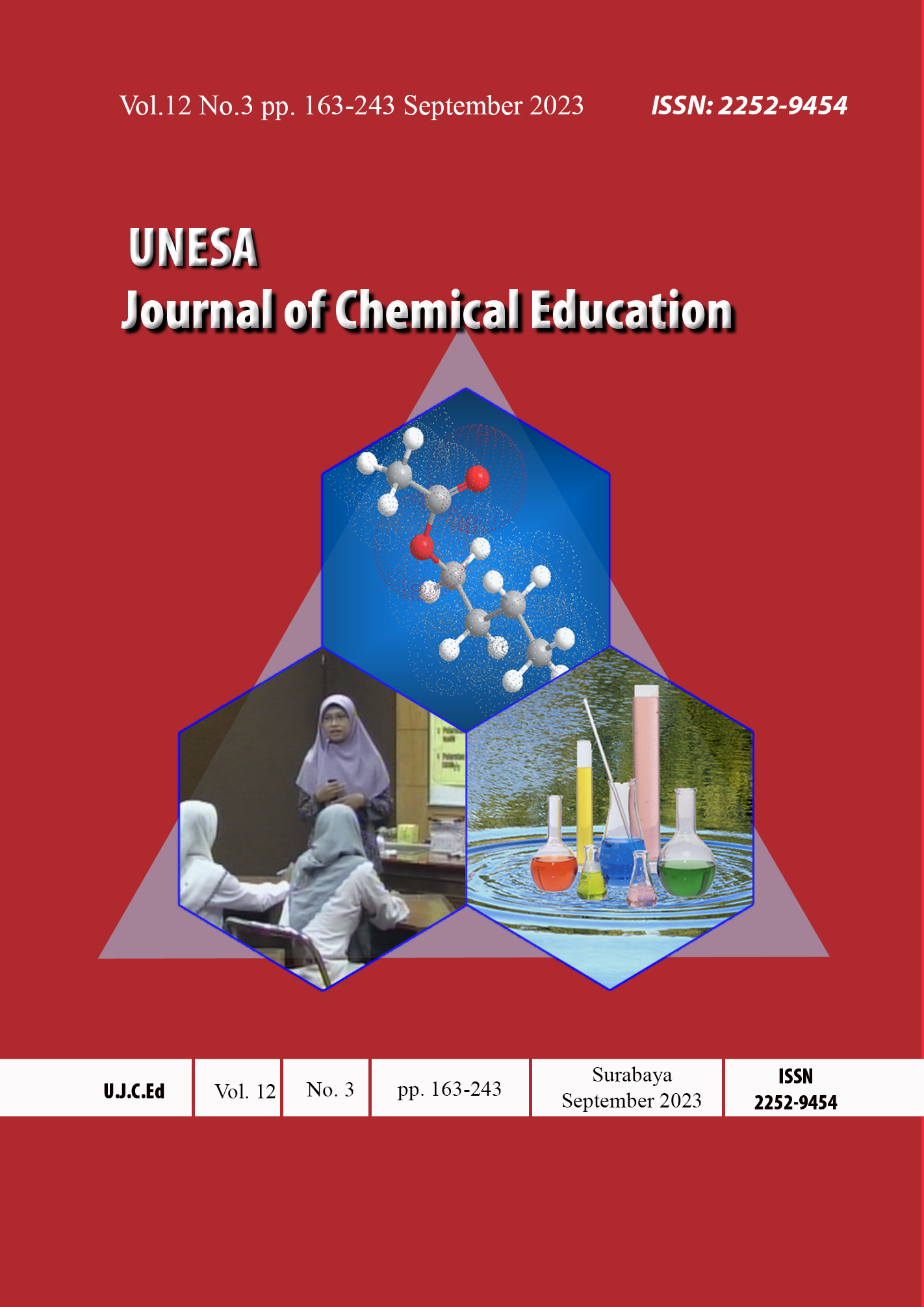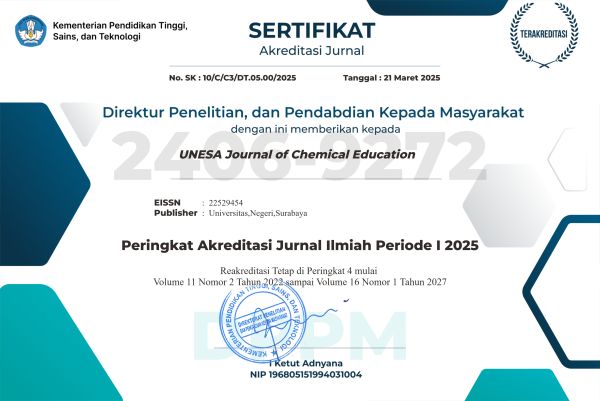THE EFFECT OF PROBLEM BASED LEARNING MODEL ON STUDENTS METACOGNITIVE KNOWLEDGE ON ACID BASE MATERIAL
DOI:
https://doi.org/10.26740/ujced.v12n3.p237-243Keywords:
knowledge metacognitive, problem solving model, acid base materialAbstract
The aim of this research is to know the influence of learning model problem solving on metacognitive knowledge in class XI IPA at one of state senior high school 10 Makassar on acid base material. Research methods that have been used are quasi-experimental with a quantitative approach and using post-test control group design. The research population is the entire XI IPA class with a total of two classes. Research samples are class XI IPA 6 as an experimental group and class XIIPA 5 as a control group. Data gathering techniques use expression tests to obtain metacognitive knowledge data. Data analysis is done using descriptive and inferential statistics. The results of the statistical analysis obtained the average metacognitive knowledge test of the experimental group 71.2 higher than the control group 58.2. The results of inferential statistical analysis of the metacognitive knowledge test results of the students showed that the data of the experimental and control groups came from homogeneous but not normally distributed populations, so the hypothetical test used was the Mann-Whitney test. From the data the results of the analysis show Zhitung (4.51) > Ztable. (1.64). Based on the results of the analysis, it can be concluded that there is an influence of the learning model Problem Solving on the metacognitive knowledge of students of grade XI High School State 10 Makassar on the acid base material.
Downloads
References
Chairani, Z. 2016. Metakognisi Siswa Dalam Pemecahan Masalah Matematika. Yogyakarta: Deepublish.
Kartika, L. D., Riyadi, & Sujadi, I. 2015. Proses Metakognisi dalam Pemecahan Masalah Matematika pada Siswa Kelas XI di SMA Negeri Banyumas. Jurnal Elektronik Pembelajaran Matematika, 3(9), 1021–1034.
Moshman, D. 2018. Metacognitive Theories Revisited. Educational Psychology Review, 30(2), 599–606.
Margono, A., Mardiyana, & Chrisnawati, H. E. 2018. Analisis Penggunaan Pengetahuan Metakognitif Siswa dalam Memecahkan Masalah Kontekstual Berdasarkan Tahapan Polya. JPMM: Jurnal Pendidikan Matematika Dan Matematika, 2(6), 471–484.
Rumana, U. 2017. Korelasi Antara Kemampuan Metakognisi Dan Membaca Cepat Siswa Kelas VIII Negeri 1 Imogiri. In Jurnal BMC Public Health (Vol. 5, Issue 1).
Fajrin, S., Haetami, A., & Marhadi, M. A. 2020. Identifikasi Kesulitan Belajar Kimia Siswa Pada Materi Pokok Larutan Asam Dan Basa Di Kelas Xi Ipa2 Sma Negeri 1 Wolowa Kabupaten Buton. Jurnal Pendidikan Kimia FKIP Universitas Halu Oleo, 5(1), 27.
Nugroho, D. M., Suryadi, B. U., & Budi, H. 2019. Identifikasi Miskonsepsi pada Materi Asam Basa Menggunakan Tes Diagnostik Two-Tier dengan Model Mental pada Siswa Kelas XII MIPA SMA N 1 SRAGEN Tahun Ajaran 2018/2019. Jurnal Pendidikan Kimia. 8(2). ISSN: 2337-9995.
Polya, G. 1973. How To Solve It: A New Aspect Of Mathematical. Method. New Jersey. USA: Pricenton University Press.
Desoete, A., Herbert R., & Ann B. 2001. Metacognition And Mathematical Problem Solving in Grade 3. Journal Of Learning Disabilities, 34(5), 435-449.
Sudjana, D., & Wijayanti, I. E. 2018. Analisis Keterampilan Metakognitif pada Materi Kelarutan dan Hasil Kali Kelarutan melalui Model Pembelajaran Pemecahan Masalah. EduChemia (Jurnal Kimia Dan Pendidikan), 3(2), 206.
Lestari, H., Suganda, O., & Widiantie, R. 2017. Hubungan Antara Pengetahuan Metakognitif Dengan Kemampuan Pemecahan Masalah Melalui Model Problem Based Learning (Pbl) Pada Konsep Pencemaran Lingkungan Di Kelas X. Quagga : Jurnal Pendidikan Dan Biologi, 9, 27.
Limbanadi, S., Subandi, S., & Munzil, M. 2020. Pengaruh Model Pembelajaran Problem Solving- Think Pair Share terhadap Pengetahuan Metakognitif Siswa. Jurnal Pendidikan: Teori, Penelitian, Dan Pengembangan, 5(6), 77.
Downloads
Published
Issue
Section
License
The license terms of the Creative Commons Attribution-NonCommercial 4.0 International (CC BY-NC 4.0) requires attribution to the original creator, permits non-commercial use, and does not allow for the application of legal or technological restrictions on others' use.
 Abstract views: 106
,
Abstract views: 106
, PDF Downloads: 80
PDF Downloads: 80













